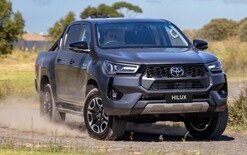Protecta plans dive into digital

Protecta Insurance is preparing to digitise more of its business when the nation moves out of lockdown and it expects rival operators will soon be doing likewise.
Chief executive Phil Hibbert told Autofile Online his company will be a “very different business post Covid-19”. He also predicts the buying habits of consumers will change once restrictions in place to contain the novel coronavirus are relaxed.
He suggests that for finance and insurance companies operating out of car dealerships, this is likely to mean spending less time dealing with customers face-to-face. Hibbert adds the current pandemic and its disruption to the automotive industry will force the hand of companies to make “dramatic” changes to their operations.
“The consumer habits of buying a vehicle are going to be very different once we start coming out of this Covid-19 situation,” he says. “There’s probably going to be less demand initially and I think how people access products and how they purchase from a car dealership will be very different.
“People will want to spend less time in a bricks-and-mortar dealership before taking delivery of a car, which for our products will be challenging because they are very much sold at point of sale. The business model has to change dramatically.”
Hibbert, pictured, says Protecta was already investigating how to increase its digital presence and offer more of its insurance services online before the coronavirus outbreak. He adds the lockdown has accelerated those plans and the company is reviewing its whole business model.
“Dealers and companies like ours are going to have to embrace technology because the policy holder wants to access products in a more transparent and efficient way, and the reality is the product has to be fit for purpose and be a product that’s adapted to the customer,” Hibbert explains.
“Protecta is going to be a different business post Covid-19. We were already under way with more self-service tools at dealerships so customers can access information and products in real-time at their desktops or on devices. That’s where we need to go and we’re already a long way down that track.
“We’re going to adopt a more digital platform across most of our dealers, but we need to determine what that servicing will look like. The old model of sales reps calling into the dealer and having a cup of tea has changed.”
Renewals bring relief
Protecta’s staff are all operating from home while the country remains on Covid-19 alert level four. Hibbert says thankfully renewals of existing policies for classics and motorbikes has kept money coming in during the lockdown period.
“Our renewal business, with policies mainly for motorcycles and classic cars, is about 25 to 30 per cent of what we do and that covers our fixed costs and so we’re not 100 per cent reliant on revenue from point-of-sale at the dealer. Within one week, we went from zero work from home capacity to the full company working from home. We did it and it has succeeded.
“In some ways the jump from one thing to the next has been good. We were going into a turbulent world anyway with the regulatory framework about to change. This has forced our hand to look at having better tools in real time and digital is the way to go. Covid-19 has affected us all and what we did yesterday isn’t going to work anymore.”
He expects many parts of the vehicle industry – and the New Zealand economy in general – will suffer about a 30 to 35 per cent drop in annualised revenues and predicts a recovery to pre-pandemic levels may be at least 12 months away.
While economically Hibbert says the pandemic has created “short-term doom and gloom”, he anticipates the vehicle industry will innovate and thrive in the long term. “We’ve got to look at our whole business model. The expenses aren’t stopping each month and with whatever revenue is coming in, we still need to be able to scale up once the market adjusts.
“This is forcing our hand to interact with the consumer differently, which will require some digital investment, but we need to pick up that momentum coming out of Covid-19. We have to be very transparent and most of that will be done online prior to customers taking delivery of the car.”
Hibbert, who has worked in North America and across south-east Asia, says overseas sales models will likely influence what is offered to New Zealand customers.
“Different markets in the world are more sophisticated than what we have here. How we sell cars in New Zealand is a relatively old model compared to the likes of Europe and North America where there’s far more digital interaction before consumers take delivery of vehicles.
“We still like that personal interaction, but that will definitely change. It’s still a business about people but we need to have the right level of sophistication in what we offer.”





